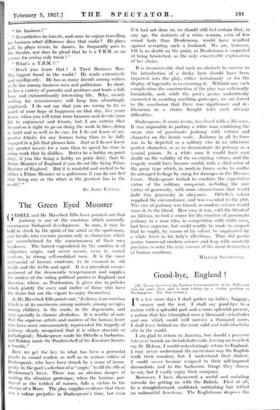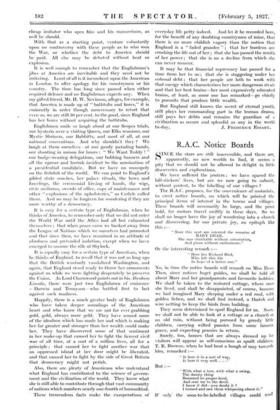Good-bye, England !
[Mr. Essary has been the London Correspondent of the noitiniore Sam for some time and is now taking up a similar position in Washington. --En. SPECTATOR.] TN a few more days I shall gather up babies, baggage, canary and the rest. I shall say good-bye to a nation with a splendid past and a more splendid present, a nation that has triumphed over a thousand vicissitudes and one which could well survive a thousand more. I .shall leave behind me the most solid and individualistic city in time world.
I am glad to return to America, but should a perverse fate ever banish me to indefinite exile, leaving me to select my St. Helena, I would unhesitatingly return to England. I may never understand the mysterious way the English work their wonders, but I understand their dialect. I could never become resigned to their self-imposed discomforts and to the barbarous things they choose to eat, but I vastly enjoy their company.
Moreover, I have discovered a useful and unfailing formula for getting on with the British. First of all, be a straightforward, undiluted, unblushing but withal an unboastful American. The Englishman despises the cheap imitator who apes him and his mannerisms, as well he should. • With that as a starting point, venture voluntarily upon no controversy with these people as to .wha won the 'War, or whether the debt to America should be paid. All else may be debated without heat or explosion.
It is well enough to remember that the Englishman's jibes at America are inevitable and they need not be irritating. Least of all is it incumbent upon the American in London to offer apology for his countrymen or his country. The time has long since passed when either required defence and no Englishman expects any. When my gifted friend, Mr. H. W. Nevinson, alleges, for example, that America is made up of " bathtubs and bores," it is eminently in order though unnecessary to retort that even so, we are still 50 per cent. to the good, since England has her bores without acquiring the bathtubs.
Englishmen smile or laugh aloud at our Scopes trials, our hysteria over a visiting Queen, our Elks reunions, our Mystic Shriners, our Babbitts, and most of all, at our national conventions. And why shouldn't they ? We laugh at them ourselves—at our gaudy parading bands, our shouting in unison for hours : " We Want Teddy ! " our badge-wearing delegations, our bobbing banners and all the uproar and hurrah incident to the nomination of a presidential candidate. But we have no monopoly on the flubdub of the world. We can point to England's gilded state coaches, her palace rituals, the bows and kneelings, the ceremonial kissing of hands, the wigs,. civic uniforms, swords of office, caps of maintenance and other " explosions of the upholsteries," as Carlyle called them. And we may be forgiven for wondering if they are more worthy of a democracy.
It is easy for a certain type of Englishman, when he thinks of America, to remember only that we did not enter the World War until the Allies had all but exhausted themselves ; that when peace came we backed away from the League of Nations which we ourselves had promoted and that since then, we have remained in an attitude of aloofness and pretended isolation, except when we have emerged to assume the role of Shylock.
It is equally easy for a certain type of American, when he thinks of England, to recallthat it was not so long ago that the British wantonly vandalized Washington, and again, that England stood ready to throw her armaments against us while we were fighting desperately to preserve the Union. As Lord Charnwood points out in his Abraham Lincoln, there were just two Englishmen of eminence —Darwin and Tennyson—who battled first to last against such madness. • Happily, there is a much greater body of Englishmen who have taken deeper soundings of the American heart and who know that we are not for ever 'grabbing gold, gold, always more gold. They have sensed some of the idealism which has made her and which is making her far greater and stronger than her wealth could make her. They have discovered some of that sentiment in her make-up that caused her to fight the fiercest civil war of all time, at a cost of a million lives, all for a principle ; that caused her to fight another war that an oppressed island at her door might be liberated, and that caused her to fight by the side of Great Britain that democracy might not perish.
Also, there are plenty of Americans who understand what England has contributed to the science of govern- ment and the civilization of the world. They know what she is still able to contribute through that vast community of nations which numbers nearly one-fourth of humankind: These tremendous facts make the - exasperations of everyday life petty indeed. And let it be recorded here, for the benefit Of any doubting countrymen of mine, that there is no more childish vagary than the notion that England is a "faded grandee " ; that her burdens are crushing the life out of her ; that she has passed the zenith . of her power ; that she is on a decline from which she can never recover.
It may be that financial supremacy has passed for a time from her to us ; that she is staggering under her colossal debt ; that her people are loth to work with that energy which characterizes her more dangerous rivals and that her best brains—her most expensively educated brains, at least, as some one has remarked—go chiefly to pursuits that produce little wealth.
But England still knows the secret of eternal youth, still plays her commanding part in the human drama, still pays her debts and remains the guardian of a civilization as secure and splendid as any in the world



























































 Previous page
Previous page